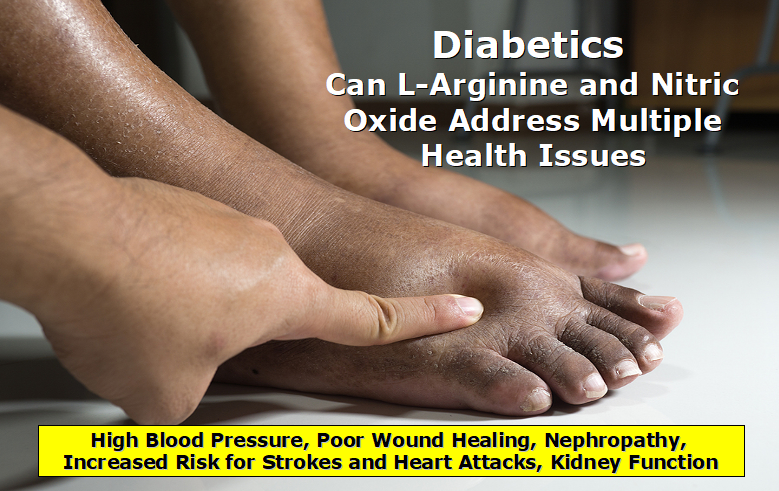From the research it’s clear that diabetics produce less nitric oxide, which may be a contributing factor in the following health concerns:
- High Blood Pressure
- Increased Risk for Heart Disease
- Increased Risk for Stroke
- Poor Kidney Function
- Poor Wound Healing
- Nephropathy
- And Atherosclerosis
Today’s post is going to examine the question, “Can L-arginine and Nitric Oxide Address Multiple Health Issues in Diabetics?”
Now before we get started let’s get a clear picture on nitric oxide and L-arginine.
Nitric oxide is a signaling molecule created in your vascular system to help regulate circulation. It is a vasodilator, which relaxes the smooth muscle of the vascular wall.
This action improves blood flow. Improved blood flow helps to:
Bring blood pressure back into the normal range.
Reduces your risk for strokes and heart attacks.
And improves blood flow to the kidneys to help them function better.
Already three diabetic concerns have been addressed.
(If you would prefer to view this information in a video format, then please click on my YouTube video below:)
L-arginine is a key amino acid that helps regulate 7 different metabolic pathways in your body. One pathway is the creation of nitric oxide. This means it’s a critical component for good cardiovascular health.
L-arginine is also needed for proper elimination of urea. And plays a key role in kidney function.
Here is a link to a PubMed article titled “L-arginine as a therapeutic tool in kidney disease.”
The proper combination of both L-arginine and nitric oxide helps to improve kidney function.
Nitric oxide directly and indirectly acts as a neurotransmitter. This signaling molecule is needed for proper potassium levels to help maintain normal nerve signal transmissions.
Nitric oxide increases blood flow so that oxygen and blood glucose can be transported to nerve cells. This helps to maintain their health and nerve conduction integrity.
Nitric oxide also help to reduce pain.
All of these benefits help to prevent and reduce nephropathy issues common to diabetics.
When it comes to wound healing, L-arginine, nitric oxide, and your endothelium, which lines all of your vascular system, work together. Your endothelium regulates your nitric oxide production.
Nitric oxide is needed for multiple stages in the wound healing process. It stimulates cell division and maturation. It aids in the formation of new blood vessel and lymph ducts. And it promotes fibroblast proliferation for skin growth.
L-arginine helps fuel the creation of nitric oxide. Plus it’s needed for the creation of proline. Proline is necessary for the proper cross-linking of collagen fibers to minimize scarring. As well as maximizing the tensile strength of the healed tissue.
So far the combination of L-arginine and nitric oxide has address almost all of the health issues facing diabetics. All but one.
That one is atherosclerosis.
High blood sugar levels causes damage to the lining of your vascular system. This becomes a major contributing factor in endothelial cell dysfunction. Which is a major contributing factor in atherosclerosis.
As I’ve share in two previous videos, L-arginine and nitric oxide are key to proper glucose metabolism. They both work to improve insulin production and reduce insulin resistance.
Additionally, nitric oxide facilitates the transport of glucose out of the blood stream into cells so that it can be used for energy creation.
All of this reduces blood glucose levels. This decreases the potential for damage to the lining of your cardiovascular system.
Which decreases your risk for atherosclerosis and health issues associated with atherosclerosis like increased potential for heart attacks and strokes.
This combination of L-arginine and nitric oxide significantly addresses the major health challenges that diabetics face.
And when combined with proper diet and exercise, can make a major difference in the health and life expectancy of all diabetics.
Blessing Lives Through Nitric Oxide Therapy!
Dan Hammer

Leave a Reply
You must be logged in to post a comment.